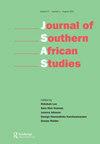China and the Troubled Prospects for Africa’s Economic Take-Off: Linkage Formation and Spillover Effects in Zambia
IF 0.7
4区 社会学
Q2 AREA STUDIES
引用次数: 0
Abstract
Chinese investment in Africa has captured the interest of both academia and the wider policy world, with some postulating that Chinese firms have the potential to bring about a structural transformation of the continent. Some scholars have even gone as far as to claim that Africa may be turned into the ‘next factory of the world’. By focusing on spillover effects – arguably the most sought-after of foreign direct investment effects – this article seeks to challenge such celebratory assumptions. Drawing on over 80 interviews with Zambian institutions and Chinese firms, supplemented by surveys carried out in these firms, we provide empirical evidence showing that Chinese investment brings little in terms of linkage formation and spillover effects, and those rare linkages that do exist relate to low-technology inputs that offer little hope for long-awaited industrial upgrading. Rather than blaming Chinese investors, however, we turn our attention to the question of institutional capacity, arguing that Zambia has largely failed when it comes to building adequate local supply capacity. This leads us to conclude that the chances of Chinese investment leading to structural transformation are limited and that this will remain the case unless industrial policy plays a more transformative role in fostering linkages and facilitating spillovers.中国与非洲经济起飞的艰难前景:联系的形成和赞比亚的溢出效应
中国在非洲的投资引起了学术界和更广泛的政策界的兴趣,一些人认为中国公司有潜力实现非洲大陆的结构转型。一些学者甚至声称,非洲可能会成为“世界的下一个工厂”。通过关注溢出效应——可以说是最受欢迎的外国直接投资效应——本文试图挑战这种庆祝性的假设。根据对赞比亚机构和中国企业的80多次采访,以及对这些企业进行的调查,我们提供了经验证据,表明中国投资在联系形成和溢出效应方面带来的影响很小,而那些罕见的联系与低技术投入有关,这些低技术投入对期待已久的产业升级几乎没有希望。然而,我们没有指责中国投资者,而是将注意力转向机构能力问题,认为赞比亚在建设足够的当地供应能力方面基本上失败了。这使我们得出结论,中国投资导致结构转型的机会是有限的,除非产业政策在促进联系和促进溢出方面发挥更具变革性的作用,否则情况仍将如此。
本文章由计算机程序翻译,如有差异,请以英文原文为准。
求助全文
约1分钟内获得全文
求助全文
来源期刊

Journal of Southern African Studies
AREA STUDIES-
CiteScore
1.40
自引率
0.00%
发文量
73
期刊介绍:
The Journal of Southern African Studies is an international publication for work of high academic quality on issues of interest and concern in the region of Southern Africa. It aims at generating fresh scholarly enquiry and rigorous exposition in the many different disciplines of the social sciences and humanities, and periodically organises and supports conferences to this end, sometimes in the region. It seeks to encourage inter-disciplinary analysis, strong comparative perspectives and research that reflects new theoretical or methodological approaches. An active advisory board and an editor based in the region demonstrate our close ties with scholars there and our commitment to promoting research in the region.
 求助内容:
求助内容: 应助结果提醒方式:
应助结果提醒方式:


